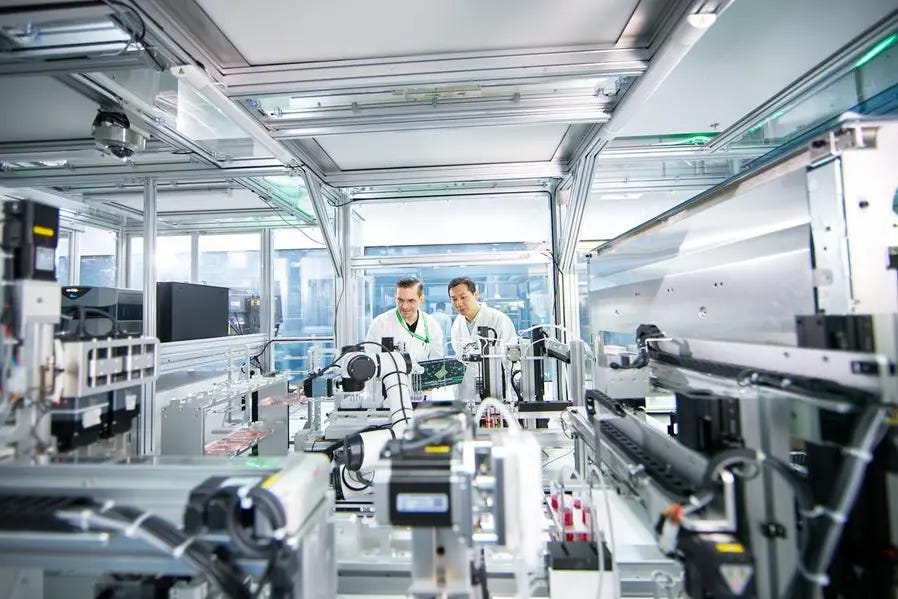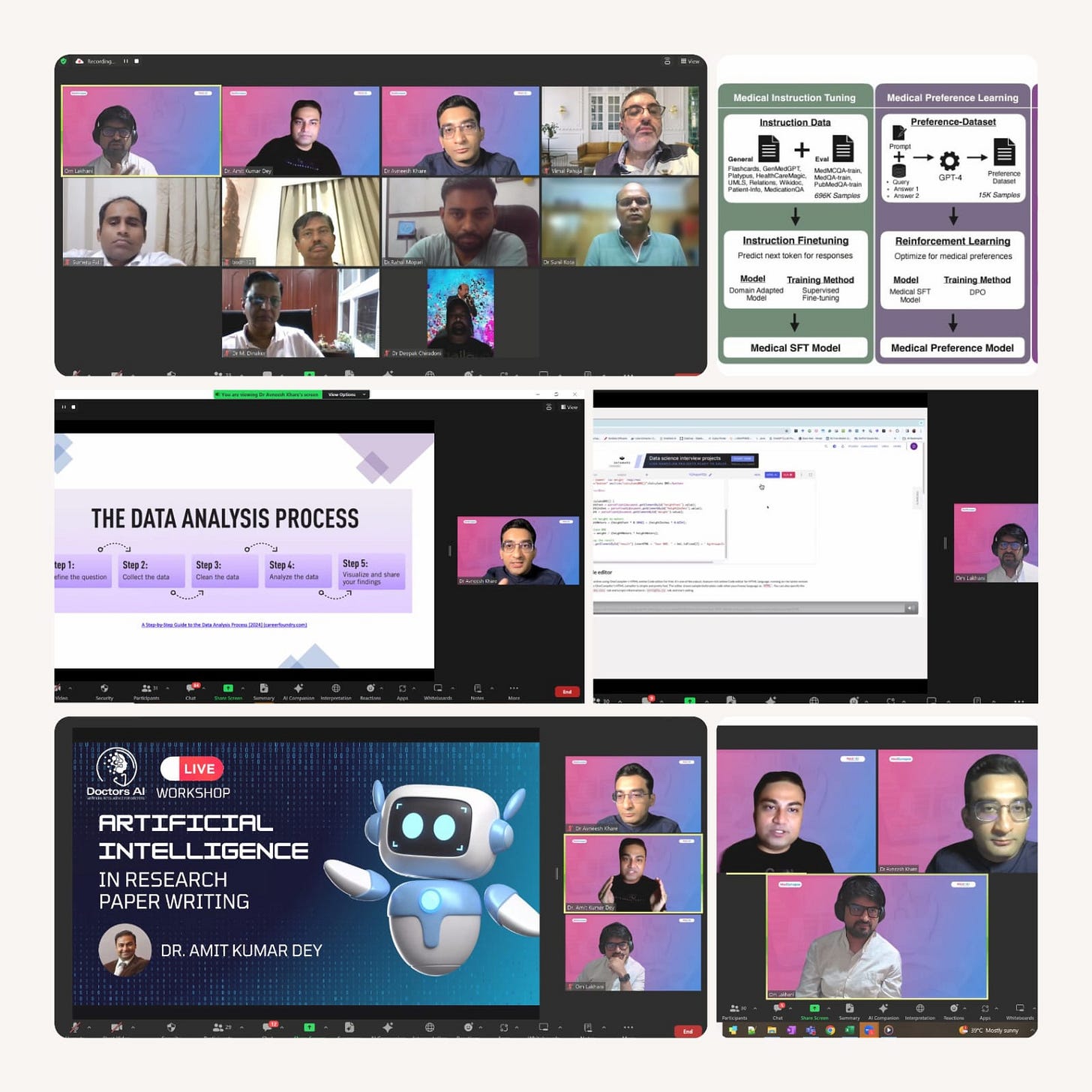⚡ From AI-Generated Drugs Entering Clinical Trials to Enhanced ER Admission Predictions & More: Dive into This Week's Med AI Innovations! 🚀
Updates on Artificial Intelligence & Emerging Technologies in Medicine 🤖💊
“Eventually, doctors will adopt AI and algorithms as their work partners. This leveling of the medical knowledge landscape will ultimately lead to a new premium: to find and train doctors who have the highest level of emotional intelligence.” ― Eric Topol, Deep Medicine: How Artificial Intelligence Can Make Healthcare Human Again
Dear Med AI Enthusiast,
Welcome to The ‘Med AI’ Capsule weekly newsletter, your inside look at how artificial intelligence and emerging technologies are transforming medicine.⚕
Whether you're a medical professional 👩⚕️, a technology enthusiast 💻, or simply someone with a curious mind 🧠, The 'Med AI' Capsule is designed for you.
It helps you stay informed 📰 about the latest groundbreaking updates and offers insights into the rapidly evolving world 🌍 of artificial intelligence and emerging technologies in medicine.
Let the adventure begin! I'm thrilled to have you along for the ride. 🚀
In today’s capsule:
5 News Updates
4 Latest Research Papers
3 Industry Innovators
2 Upcoming Events
1 Knowledge Resource
Reading Time: 7-10 minutes
News Updates 📰
1. 💊 Insilico Medicine's AI-Generated Drug Enters Clinical Trials
UAE-based Insilico Medicine has advanced the world’s first fully AI-generated drug to clinical trials. The drug, designed to treat idiopathic pulmonary fibrosis, marks a significant milestone in AI-driven pharmaceutical innovation.

Why Important: This achievement underscores the transformative potential of AI in drug discovery, enabling rapid development of treatments for complex diseases. Insilico's AI platform has identified a novel biological target to combat idiopathic pulmonary fibrosis, highlighting AI’s capability to revolutionize medical research and patient care.
Caution: Despite the groundbreaking nature of this AI-generated drug, its success in clinical trials is crucial for validation, involving rigorous testing to ensure safety and efficacy. Integrating such advanced AI solutions into healthcare systems will also require addressing potential ethical and operational challenges.
2. 🏥 AI Helps Enhance ER Admission Predictions
Generative artificial intelligence (AI), such as GPT-4, can help predict whether an emergency room patient needs to be admitted to the hospital with minimal training on limited records, according to investigators at the Icahn School of Medicine at Mount Sinai.
Why Important: This study demonstrates the potential of AI to enhance clinical decision-making in high-volume settings like emergency rooms. GPT-4's ability to provide reasoning for its decisions sets it apart from traditional models, potentially improving patient outcomes and operational efficiency in hospitals.
"Our research suggests that AI could soon support doctors in emergency rooms by making quick, informed decisions about patient admissions. This work opens the door for further innovation in health care AI, encouraging the development of models that can reason and learn from limited data, like human experts do.” - Girish N. Nadkarni, MD, MPH
Caution: While the results are promising, AI is currently a supportive tool, enhancing rather than replacing the human component of healthcare. Rigorous testing, validation, and careful consideration of ethical and operational challenges are necessary for safe and effective integration into healthcare systems.
3. 🧬 AI Shows Potential in Boosting Prediction of Autoimmune Diseases
Researchers at Penn State College of Medicine have developed a new artificial intelligence algorithm that may lead to improved predictions and novel therapies for autoimmune diseases. The algorithm analyzes genetic codes to model gene expression and regulation, identifying additional genes of risk.
Why Important: This AI-driven approach outperforms existing methodologies, identifying 26% more novel gene and trait associations. Enhanced prediction of autoimmune disease risk allows for earlier interventions and the development of targeted therapies, potentially transforming treatment and patient outcomes.
Caution: While promising, these findings need validation in laboratory settings and clinical trials. The successful integration of AI in predicting and treating autoimmune diseases requires careful consideration of ethical and operational challenges to ensure safe and effective application in healthcare.
4. 🤖 American Society for Gastroenterological Endoscopy Unveils AI Institute for Gastroenterology
The American Society for Gastroenterological Endoscopy (ASGE) has announced the launch of the Artificial Intelligence Institute for Gastroenterology at Digestive Disease Week (DDW). This initiative aims to integrate artificial intelligence (AI) into gastrointestinal (GI) care, enhancing patient outcomes and driving innovation in the field.
Why Important: The Institute's mission to incorporate AI into GI care represents a significant step towards improving patient outcomes and operational efficiencies in gastroenterology. By focusing on education, training, advocacy, and the development of standards, ASGE is setting a new benchmark in patient care and safety, ensuring that healthcare professionals are equipped to leverage AI technologies effectively.
Caution: While the integration of AI promises transformative benefits, it requires meticulous implementation and ongoing collaboration with regulatory bodies, policymakers, and industry stakeholders. Ensuring transparent, equitable, and ethical use of AI in GI healthcare is crucial to its success and acceptance in clinical settings.
5. 🧠 AI Tool DEPLOY Accelerates Brain Tumor Classification
Researchers have developed DEPLOY, an AI tool capable of classifying brain tumors into 10 major subtypes with 95% accuracy. DEPLOY analyzes microscopic images of tumor tissue, offering a faster and more accessible alternative to DNA methylation-based profiling.
Why Important: DEPLOY provides a rapid and accurate method for brain tumor classification, significantly reducing the time required for diagnosis and enabling quicker treatment decisions. This tool has the potential to improve patient outcomes and may be applicable to other types of cancer in the future.
Caution: While DEPLOY shows high accuracy and potential, its implementation as a complementary tool to pathologists requires further validation. Ensuring the availability and integration of this AI technology in clinical settings will be crucial for its widespread adoption and effectiveness in improving cancer diagnostics.
Latest Research Papers 🔬
The Use of Generative AI for Scientific Literature Searches for Systematic Reviews: ChatGPT and Microsoft Bing AI Performance Evaluation - found that while Bing AI provided more accurate and reliable results than ChatGPT, neither tool is currently suitable for real-time evidence generation in clinical decision support systems due to limitations in accuracy and feasibility.
Towards proactive palliative care in oncology: developing an explainable EHR-based machine learning model for mortality risk prediction - developed an explainable machine learning model using EHR data to predict 365-day mortality risk in advanced cancer patients, showing good discrimination and precision-recall, aimed at facilitating proactive palliative care.
Development and validation of a deep-learning model to predict 10-year atherosclerotic cardiovascular disease risk from retinal images using the UK Biobank and EyePACS 10K datasets - demonstrated comparable accuracy to traditional methods and showing potential for enhanced risk assessment, especially in individuals with diabetes, across diverse populations.
Comparison of artificial intelligence large language model chatbots in answering frequently asked questions in anaesthesia - ChatGPT4 and Bard outperformed Bing Chat in overall performance, particularly in comprehensiveness, while all three chatbots excelled in communication quality but were suboptimal in medical content quality.
Industry Innovators 👨🏭
Pieces - offers AI solutions to assist frontline care teams by automating documentation and improving patient care, including tools for patient overviews, discharge tracking, and daily progress notes. They provide customizable predictive models for clinical and operational improvements, suggest diagnoses for billing accuracy, and ensure minimal AI hallucination through the Pieces SafeRead platform with adversarial AI and clinician oversight.
Rad AI - provides AI-driven radiology solutions designed to enhance productivity, reduce burnout, and improve patient care. Their products include Rad AI Reporting for efficient radiology reporting, Rad AI Omni for automating impressions, Rad AI Nexus for dynamic worklists, and Rad AI Continuity for managing patient follow-ups. The company's tools aim to save radiologists time and improve the quality and accuracy of their reports while maintaining high standards of privacy and security.
Proximie - offers a telehealth platform enabling real-time remote collaboration for surgeries, allowing surgeons to virtually join operations, provide guidance, and access critical data from anywhere, integrating seamlessly with hospital systems to enhance surgical precision, training, and outcomes through augmented reality, AI, and machine learning.
Upcoming Events 🧑💻
Doctors AI conducted a highly intense 🧠 6-hour marathon hands-on AI training session on a Sunday afternoon/ evening, with 35+ engaging medical professionals joining from all over India and abroad!
AI literacy is key to the rapid adoption of this ever-changing landscape in healthcare, and it was heartwarming to witness such highly interactive participation from everyone who joined.
If you missed out on this one, we’ll be coming up with another workshop! Dates to be announced soon!
Knowledge Resource 📚
Blog Article: 10 Ways To Get Started In AI — Without Being Technical (forbes.com)
This article features insights from Allie K. Miller, an AI leader, advisor, and investor, who shares practical advice on how non-technical professionals can get involved in AI.
The article outlines a list of 10 steps, ranked from easiest to hardest, to help individuals start a career in AI or integrate AI into their business. These steps include reading AI trends, forecasting job evolution, finding a mentor, attending conferences, enrolling in courses, implementing AI in one’s company, joining or starting ML projects, working with AI startups, and potentially starting an AI company.
The article emphasizes that AI is not just for engineers and that there are opportunities for professionals from various fields to engage with AI technology. The article encourages readers to take initiative and explore AI to future-proof their careers or businesses.
Let’s wrap it up with a poll! 📊
Your feedback is crucial to me, as it helps me understand your interests and improve my offerings. I would appreciate it if you could take a few minutes to share your thoughts about what you've enjoyed and what you think I could do better.
Stay tuned for our upcoming editions as we explore the latest breakthroughs and dive deep into the transformative power of artificial intelligence and emerging technologies, shaping a healthier future. 🚀
Warm regards,






